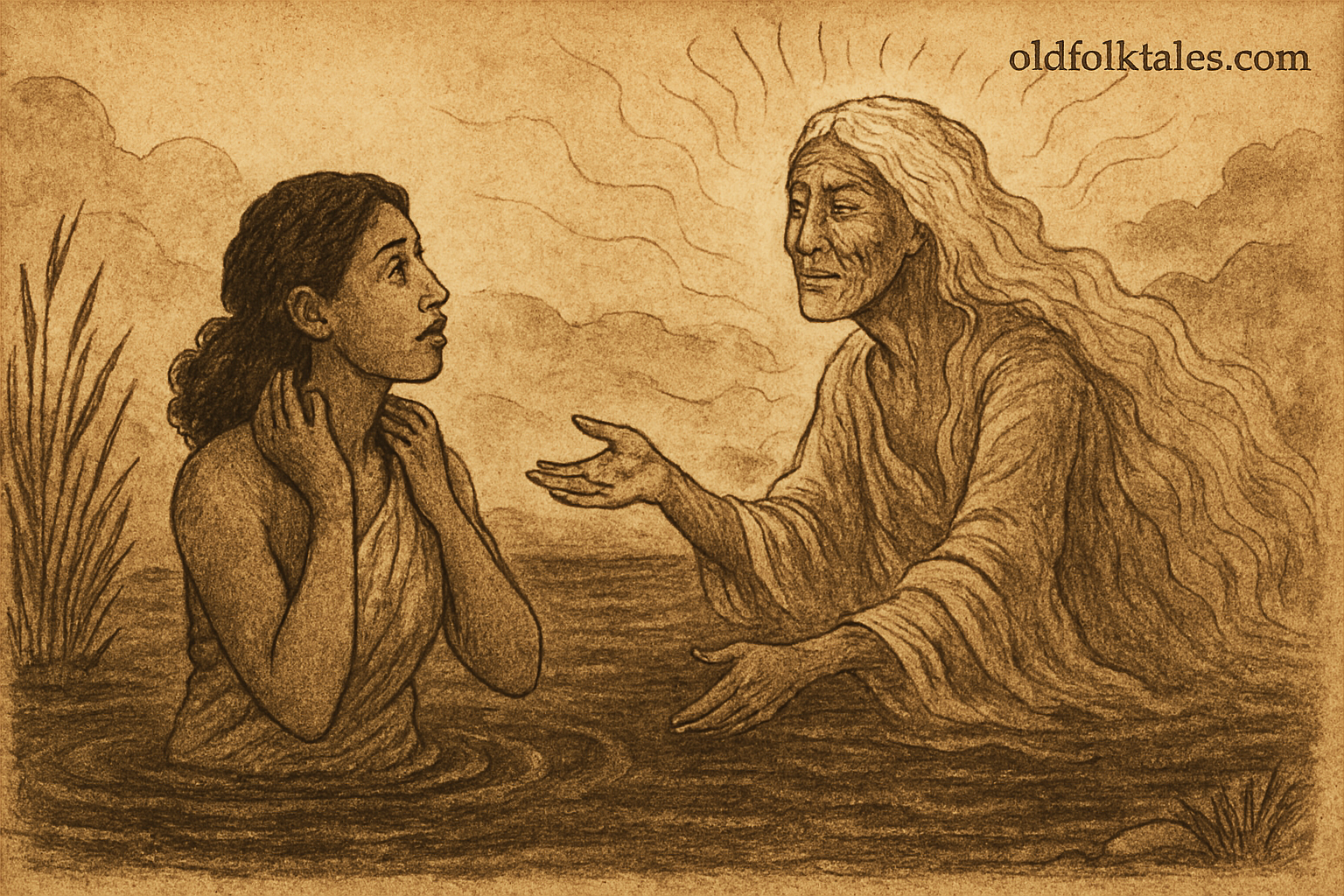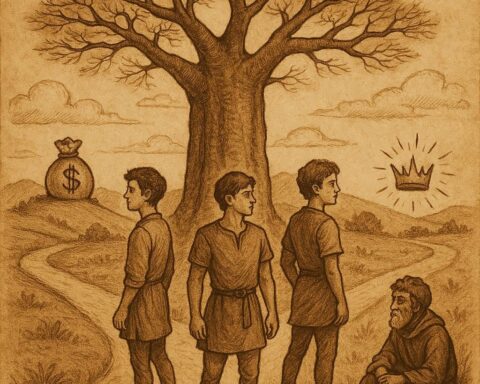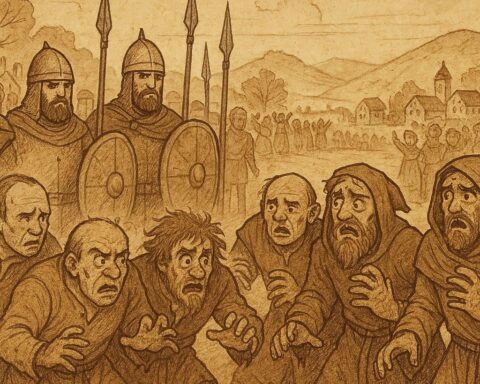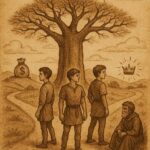In a time when drums spoke the language of the spirits and rivers held ancient secrets, there lived a master craftsman named Tachi Nanga. Throughout the land, his name was whispered with reverence, for no one could match his extraordinary skill at making drums. His fingers possessed an almost mystical ability to stretch animal hide to the exact pitch, creating instruments that sang with the voices of ancestors. People journeyed for days, sometimes months, crossing vast distances just to watch him work or place their orders. Yet it was not his renowned craftsmanship that would change the lives of two sisters, but rather his most unusual characteristic: he performed every task with his buttocks.
These two sisters had known hardship from their earliest days. When they were still young children, tragedy struck their family. Their beloved mother died during childbirth, taking with her a stillborn third child and leaving the girls orphaned in all but name. Though their father eventually remarried, their stepmother brought no warmth or care into their lives. They were treated as unwanted burdens, sent daily to toil in the fields under the scorching sun, only to return home to meager scraps of food. When they complained of their harsh treatment, their father turned a deaf ear to their pleas.
Also read: Pride Before the Fall
One morning, the older daughter, Manda, could bear the misery no longer. With determined resolve, she cooked what food she could gather, packed it carefully in her neshre, and left the family compound forever. She had no destination in mind, remembering only the ancient wisdom that one road always leads to another. When curious passersby asked about her journey, she would simply reply, “I am not going anywhere.”
For an entire day and through the dark night, Manda walked steadily forward. On the second day, she arrived at the banks of a mysterious river, its waters black as midnight. There, sitting hunched by the water’s edge, was the most ancient woman she had ever seen. The old woman’s back was so bent with age that her head rested between her thighs, and one withered hand dangled in the dark pool.
Despite her exhaustion, Manda approached respectfully. “Mother, my greetings to you,” she said with the courtesy her upbringing had taught her.
The old woman slowly lifted her head, squinting at the young traveler. After learning Manda’s name and hearing her story, the ancient one spoke of her terrible hunger. Without hesitation, Manda shared her precious food, giving the old woman four bundles of achu and soup. She even fashioned a funnel from a plantain leaf to bring fresh water from the river.
“You’ve saved me from the pangs of death,” the old woman whispered gratefully. “When you reach the place where two paths meet, ignore the one that shines with cleanliness and brightness. Take instead the path overgrown with grass.” Though Manda worried about leaving the frail elder alone, the woman assured her she would follow shortly.
Following the cryptic advice, Manda chose the overgrown path and soon found herself on a wide, paved road that led to Tachi Nanga’s compound. There she encountered his most faithful companion: a remarkable rooster who served as the repository of all knowledge in the land. When Cock saw Manda arrive, he immediately crowed a warning song about the “hideous newlywed” who had come to visit.
Tachi Nanga rushed home from a death celebration, moving in his peculiar way entirely on his buttocks. To Manda’s amazement, he greeted her, spoke to her, and even cooked elaborate meals using only his posterior. He prepared delicious sese plantain with smoked deer meat, seasoned with palm oil and crayfish, all while maneuvering skillfully on his buttocks.
That night, Tachi Nanga tested his guest by releasing armies of ants to torment her as she tried to sleep on an animal skin. Though the insects bit her mercilessly throughout the long hours, Manda never complained. When asked about her rest the next morning, she graciously replied that she had slept wonderfully.
During her stay, Manda showed kindness not only to her strange host but also to his rooster companion. While eating her meals, she always shared portions with Cock, despite his master’s watchful eye. When Tachi Nanga would ask if she had shared her food, the ungrateful rooster would always lie, claiming she was greedy and had given him nothing.
On the day of her departure, Tachi Nanga prepared an enormous feast, filling her neshre with plantains and the finest smoked meat. Before leaving, Manda secretly gave Cock a generous portion of food. In gratitude, the rooster offered crucial advice: “When you wish to bathe, ignore the pool that sparkles like a python’s egg. Instead, choose the dark waters and do not be afraid.”
Following Cock’s guidance, Manda passed by the brilliant, sparkling pool and stopped at one with waters as dark as night. As she bathed in its mysterious depths, the same ancient woman emerged from the water. Four times Grandmother pushed Manda beneath the dark surface, and each time she emerged transformed: first as a beautiful woman in expensive garments, then receiving trunks full of fine dresses, next with a healthy baby and nursemaid, and finally with a mboneble mo, a symbol of great prosperity.
When Manda returned home, her own family barely recognized the radiant woman she had become. Her younger sister, Ajientoh, was consumed with jealous curiosity about the treasures Manda had acquired. When Manda generously shared her beads, giving three strings to her sister and four to a friend, Ajientoh complained bitterly about receiving fewer than an outsider.
“Go look for your own treasures,” Manda finally declared, “and give me two rows of beads when you return!”
True to her impatient nature, Ajientoh hastily prepared soft, poorly made achu and set off on her own journey. But where Manda had shown kindness, Ajientoh displayed only rudeness and selfishness. She insulted every animal she encountered: dismissing the fowl’s greeting, berating the pig for dirtying her path, and scorning the cat’s request for food.
When she reached the ancient woman by the river, Ajientoh was equally cruel, calling her a “gaunt old thing” and demanding she move out of the way. She showed no gratitude for the elder’s advice about the paths and bathed rudely in the river without permission.
At Tachi Nanga’s compound, Ajientoh’s behavior was equally appalling. She mocked Cock, complained about the buttock-prepared meals even as she devoured them greedily, and shared nothing with the faithful rooster. When the ants tormented her at night, she screamed and complained loudly about the unbearable conditions.
Ignoring Cock’s reversed advice (given in frustration at her selfish behavior), Ajientoh chose to bathe in the sparkling pool instead of the dark one. Masked spirits immediately chased her from the water, forcing her to flee naked and empty-handed back to her village.
When she arrived home without clothes or treasures, Ajientoh could only complain about her terrible experiences. Her sister Manda, remembering the ingratitude Ajientoh had shown, refused to share her fine garments. Their father found only rags and scraps of cloth, which Ajientoh stitched into a rough njagasa that she wore as a constant reminder of her journey’s failure.
The Moral of the Story
This powerful tale teaches that kindness, generosity, and respect for others, especially the elderly and less fortunate, are rewarded abundantly by the universe. Manda’s gentle heart and willingness to share, even when she had little, brought her prosperity and beauty. Meanwhile, Ajientoh’s selfishness, rudeness, and greed resulted in shame and poverty. The story reminds us that our treatment of others, particularly those who appear to have nothing to offer us, reveals our true character and determines our ultimate fate.
Knowledge Check
Q1: Who is Tachi Nanga in “The Two Sisters” folktale? A: Tachi Nanga is a renowned drum maker famous throughout the land for his skill, who performs all his daily tasks using only his buttocks and lives with a wise rooster companion.
Q2: What does the ancient woman by the river represent in West African folklore? A: The ancient woman represents a supernatural guardian or ancestral spirit who tests travelers’ character and rewards kindness while punishing cruelty and selfishness.
Q3: What is the significance of the two different pools in the story? A: The dark pool represents humility and spiritual transformation, while the sparkling pool symbolizes superficial attraction and vanity, teaching that true rewards come from choosing the humble path.
Q4: How do Manda and Ajientoh’s different treatments of Cock the rooster affect their outcomes? A: Manda’s kindness in sharing food with Cock earns her helpful advice for her journey, while Ajientoh’s selfish refusal to share leads Cock to give her misleading directions that result in her downfall.
Q5: What cultural values does “The Two Sisters” folktale teach? A: The story emphasizes traditional West African values of hospitality, respect for elders, generosity to the less fortunate, and the belief that one’s actions toward others determine their fate and blessings.
Q6: What is the meaning behind the different rewards Manda receives in the dark pool? A: Manda’s transformations represent complete prosperity: beauty and fine clothes (social status), trunks of dresses (material wealth), a baby and nursemaid (family blessings), and a mboneble mo (spiritual protection).
Source: The sacred door and other stories, Cameroon folktales of the Beba (1st ed.). Ohio University Press.





